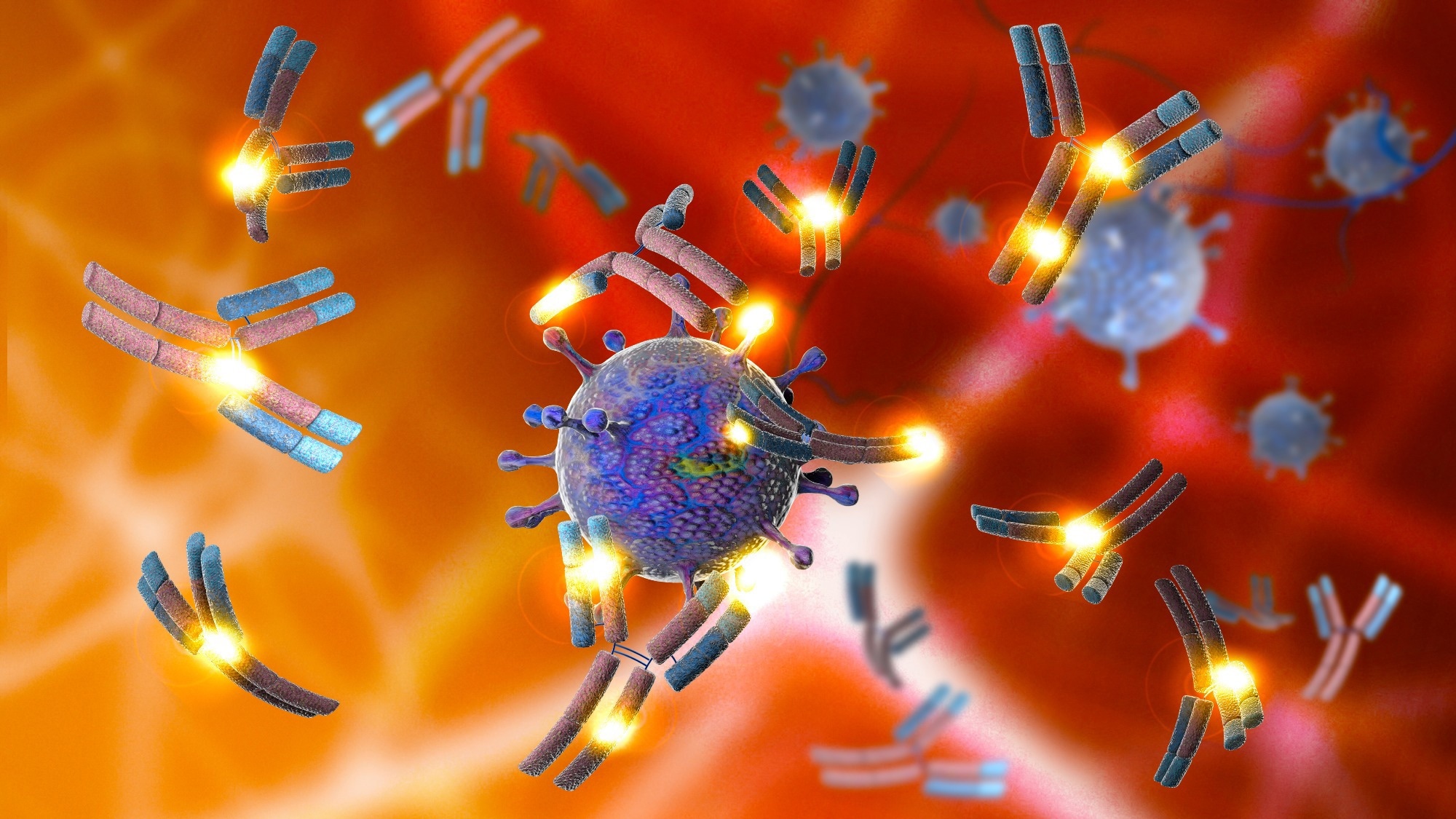First, they assessed the effectiveness of anti-SARS-CoV-2 mAbs, and mAb fragments alone or combined versus placebo or no intervention for pre‐exposure prophylaxis (PrEP) and postexposure prophylaxis (PEP) of coronavirus disease 2019 (COVID‐19). Scientists utilize B cells of SARS-CoV-2 infected individuals to extract mAbs in laboratories. These molecules are continuously under investigation as potential prophylaxis agents and for COVID‐19 treatment.
 Study: SARS‐CoV‐2‐neutralising monoclonal antibodies to prevent COVID‐19. Image Credit: Naeblys / Shutterstock
Study: SARS‐CoV‐2‐neutralising monoclonal antibodies to prevent COVID‐19. Image Credit: Naeblys / Shutterstock
About the study
In the present study, the authors commenced a comprehensive search on the Cochrane COVID‐19 Study Register, Medical Literature Analysis and Retrieval System Online (MEDLINE), Excerpta Medica Database (Embase), and three other databases on 27 April 2022.
Two authors independently reviewed search results to extract relevant data for the study analyses. They used Cochrane RoB 2 in assessing the risk of bias and the grading of recommendations assessment, development and evaluation (GRADE) approach to rate the certainty of evidence into four levels - very low, low, moderate, and high. The study outcomes included SARS-CoV-2 infection, the development of COVID‐19 symptoms, all‐cause mortality, hospital admission, quality of life, and adverse events (AEs), including serious adverse events (SAEs).
Study findings
The researchers identified four RCTs of 9,749 participants, with a median age between 42 to 76 years, who were previously uninfected and unvaccinated at baseline. In addition, 72.8% to 82.2% of participants were seronegative at baseline. Around 20% to 77.5% of participants in the PrEP studies had at least one risk factor for severe COVID‐19. They described two PrEP studies in detail.
- Tixagevimab/cilgavimab versus placebo
In this study, the researchers censored ~39.3% of participants for efficacy and 13.8% due to vaccination while evaluating the effectiveness of tixagevimab/cilgavimab in participants exposed to SARS‐CoV‐2 wild‐type, Alpha, Beta, and Delta variants. Within six months, tixagevimab/cilgavimab reduced the probability of SARS‐CoV‐2 infection, with a risk ratio (RR)=0.45 and 95% confidence interval (CI) versus placebo. This treatment also decreased the development of clinical COVID‐19 symptoms and hospital admissions, with RRs of 0.18 and 0.03, respectively. However, it had no or little impact on mortality, all‐grade AEs, and SAEs.
- Casirivimab/imdevimab versus placebo
In this study evaluating casirivimab/imdevimab versus placebo, 36.5% of participants were vaccinated. Within six months of exposure to SARS‐CoV‐2 wild‐type, Alpha, Beta, and Delta variants, casirivimab/imdevimab treatment showed some evidence of decreasing the development of clinical COVID‐19 symptoms and reducing the possibility of SARS‐CoV‐2 infection, with RRs of 0.01 and 0.02, respectively. The researchers remained uncertain whether casirivimab/imdevimab affected mortality regardless of the seropositivity status of each participant. Likewise, the evidence was low-certainty about the effects on grade three to four AEs and SAEs.
Approximately 35% to 100% of participants in the PEP studies had at least one severe COVID‐19 risk factor. They described two PEP studies in detail.
- Bamlanivimab versus placebo
This study evaluated bamlanivimab versus placebo in participants likely exposed to SARS‐CoV‐2 wild‐type. It probably decreased SARS-CoV-2 infection by day 29 and had little to no impact on all‐cause mortality by day 60, with RRs=0.76 and 0.83, respectively. The study did not report hospital admissions and the development of clinical COVID‐19 symptoms.
- Casirivimab/imdevimab versus placebo
Like the other PEP study, this study evaluated casirivimab/imdevimab versus placebo in participants who likely got exposed to SARS‐CoV‐2 wild‐type, Alpha, but less likely to Delta variant. Within 30 days, casirivimab/imdevimab decreased infection with SARS‐CoV‐2, with RR=0.34, and the development of clinical COVID‐19 symptoms, RR 0.19, among 1505 participants (high-certainty evidence). Conversely, it had no or meager impact on mortality, with RR 3.00, 95% CI, and hospital admission. The study results also indicated that casirivimab/imdevimab treatment might slightly decrease grade three to four AEs (RR=0.50) but decreased all‐grade AEs, RR 0.70, with high-certainty evidence. Lastly, it had little or no impact on SAEs in participants regardless of their serostatus.
Conclusions
Despite high‐to‐moderate certainty evidence for some COVID-19 outcomes, the study findings were inconclusive and applied only to people unvaccinated against COVID‐19. Moreover, these findings applied to the SARS-CoV-2 variants circulating during the study period and not the other variants, such as Omicron. Previous in vitro studies have shown that tixagevimab/cilgavimab is effective against Omicron, with no supporting clinical data. Likewise, in vitro studies have also proved the ineffectiveness of bamlanivimab and casirivimab/imdevimab against Omicron. Further studies could only conclusively resolve the uncertainties uncovered in the current study.
Journal reference:
- SARS‐CoV‐2‐neutralising monoclonal antibodies to prevent COVID‐19, Caroline Hirsch, Yun Soo Park, Vanessa Piechotta, Khai Li Chai, Lise J Estcourt, Ina Monsef, Susanne Salomon, Erica M Wood, Cynthia So-Osman, Zoe McQuilten, Christoph D Spinner, Jakob J Malin, Miriam Stegemann, Nicole Skoetz, Nina Kreuzberger, Cochrane Library 2022, DOI: https://doi.org/10.1002/14651858.CD014945.pub2, https://www.cochranelibrary.com/cdsr/doi/10.1002/14651858.CD014945.pub2/full